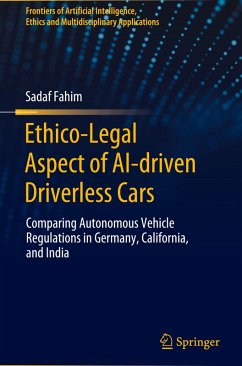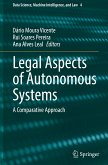This book is a comparative study of the laws and regulations involving legal and ethical issues related to Artificial Intelligence (AI), in particular for self-driving cars or autonomous vehicles (AVs). It identifies, analyzes, and points out such issues via a study of laws and regulations in India, Germany, and California, determining the legal liabilities of designer, developer/programmer, manufacturer, producer, users, or AI in the case of AVs. AV technology is being touted as one that is poised to bring revolution in the mobility ecosystem by lessening the number of accidents and by providing other benefits, such as potential to reduce traffic, increase safety and mobility, lower energy usage and generate free time. Despite having such a potential to shape and transform the future, and involvement of tech-giants like Google, Amazon, Facebook, and Microsoft, regulations around AI and AVs are still on the drawing board stage in many countries, as they grapple on how to address this issue which has both local and global players involved and affects both local and global populace.
The book studies and compares the existing and evolving regulations in three different regions to bring out the lacunae, loopholes and best practices. It highlights when AI deserves legal personhood, and when it requires to be granted legal standing. It also points out the civil and criminal legal liabilities arising when AV is involved in an accident, and the ethical issues involved in the deployment of AI. The book goes beyond new regulations to analyze whether challenges and problems arising from AI technology can be addressed within existing civil and criminal laws - procedural and substantive law - or whether a sui generis law on AI technology is required. The analysis and the results showcased here would be highly useful for multi-disciplinary research on the topic. Regulators of both industry and governance would find the contents invaluable in getting a broader picture of the issues and concerns around this topic, along with policy makers would be able to come up with more effective regulations on AI and AVs.
The book studies and compares the existing and evolving regulations in three different regions to bring out the lacunae, loopholes and best practices. It highlights when AI deserves legal personhood, and when it requires to be granted legal standing. It also points out the civil and criminal legal liabilities arising when AV is involved in an accident, and the ethical issues involved in the deployment of AI. The book goes beyond new regulations to analyze whether challenges and problems arising from AI technology can be addressed within existing civil and criminal laws - procedural and substantive law - or whether a sui generis law on AI technology is required. The analysis and the results showcased here would be highly useful for multi-disciplinary research on the topic. Regulators of both industry and governance would find the contents invaluable in getting a broader picture of the issues and concerns around this topic, along with policy makers would be able to come up with more effective regulations on AI and AVs.








